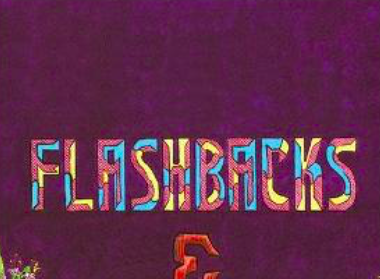Isobel Roach reviews Flashbacks & Flowers from Rufus Mufasa, a poetry collection which plays with rhythm and rhyme whilst exploring themes of identity and spirituality.
A ‘coming of age story for every stage of your life’, performance-poet Rufus Mufasa’s poetry collection Flashbacks & Flowers is a dynamic and tactile exploration of the self. With a background in spoken word and music — particularly hip-hop, a genre that plays a central role in Mufasa’s poetic memoir — the collection sings off the page, recounting memories of primary school, adolescence, and the arrival of motherhood. Mufasa’s pen is always restless and hurried, attune to a bassline beat that powers the music of her language, lifting it off the page. Rhyme and rhythm come together under the influence of rap to produce harmonious couplets that are pleasing to read in their simplicity (‘Whipped ninety-nines — I’d eat their flakes and mine’). In this way, many of the poems in Flashbacks & Flowers lend themselves to being read aloud; perhaps a certain spark is lost when these lyrical marvels are committed to the page without the voice of their author to bring them to life. But the collection’s intense readability makes this a grievance that’s easy to overlook. Mufasa’s book of stories and songs is hard to put down; gripping in its confessional tone and skilled in its crafting of narrative, I often found it difficult to tear myself away from the page.
Mufasa’s playfulness with language extends beyond musicality and encompasses dialect, voice, and bilingualism. A means of exploring identity, several of the poems in Flashbacks & Flowers slip between English and Welsh as Mufasa seeks to recreate childhood recollections of family and place. ‘Y Gegin Fach’ is one such poem, and its beautiful integration of the Welsh language brings an authenticity to the poet’s lived experiences. We are introduced to the ‘papur wal retro made of lung-like flowers’, and ‘cadair ffyddlon Auntie Phyllis’ — images of family life that roll off the tongue. If, like me, your understanding of Welsh relies a bit too heavily on half-forgotten high school lessons, Mufasa’s inclusion of explanatory notes at the end of the collection provides a helpful guide to better understanding her work and thought processes.
Perhaps unsurprisingly given the collection’s title, Mufasa’s poetry engages heavily with the natural world as a form of spirituality and ancestry — a guiding force capable of cutting through the unforgiving urban environment. The healing power of nature manifests itself, on occasion, in the form of magic. Witch-like matriarchs and wise women from the poet’s past make their presence felt in poems like ‘Summer of ’94’, which conjures up the image of Cat Lady. This empowering role model ‘worshipped the Moon and Sun’, introducing the deep feminine connection to the earth that seems to drive Mufasa’s ideology of womanhood, magic, and ancestry. Central to all this is the figure of the mother, displayed so tenderly in the collection’s later poems following Mufasa’s own experiences with pregnancy, birth, and childrearing. ‘Birth Plan’ is a sensory and bodily exploration of growing a child, set against a wild, natural backdrop. ‘Koala Mufasa’ paints a lovingly delicate portrait of the poet’s young daughter who, Mufasa tells us, ‘stops to smell everything — / the leaves, the breeze, my ancestors’ memories’.
Providing a darkness that undercuts this utopic vision of the female realm is the collection’s concern with trauma — particularly the trauma that comes from growing up as a girl. Flashbacks & Flowers is bold and unflinching in its portrayal of sexual assault; Mufasa’s work is particularly visceral in ‘Once Were CaeCoedians’, recounting a traumatic non-consensual encounter as a teen (‘I woke up, gasping for breath, dehydrated, no clothes.’). But Mufasa truly finds her voice in ‘Toby said’, a powerful and moving indictment of sexism, misogyny, and assault. Here the poet responds to male criticism of the #MeToo movement in a thrilling poem — half therapeutic confessional, half furious call to arms — that, like many of the works in Flashbacks & Flowers, deserves to be read in its own right. The righteous anger of ‘Toby said’ provides a kind of poetic crescendo to a collection that not only recounts the loves and losses of a single life, but is intergenerational and all-encompassing in its warmth, love, and healing power.
Flashbacks & Flowers by Rufus Mufasa is available now from Indigo Dreams.
Isobel Roach is a regular contributor to Wales Arts Review.











